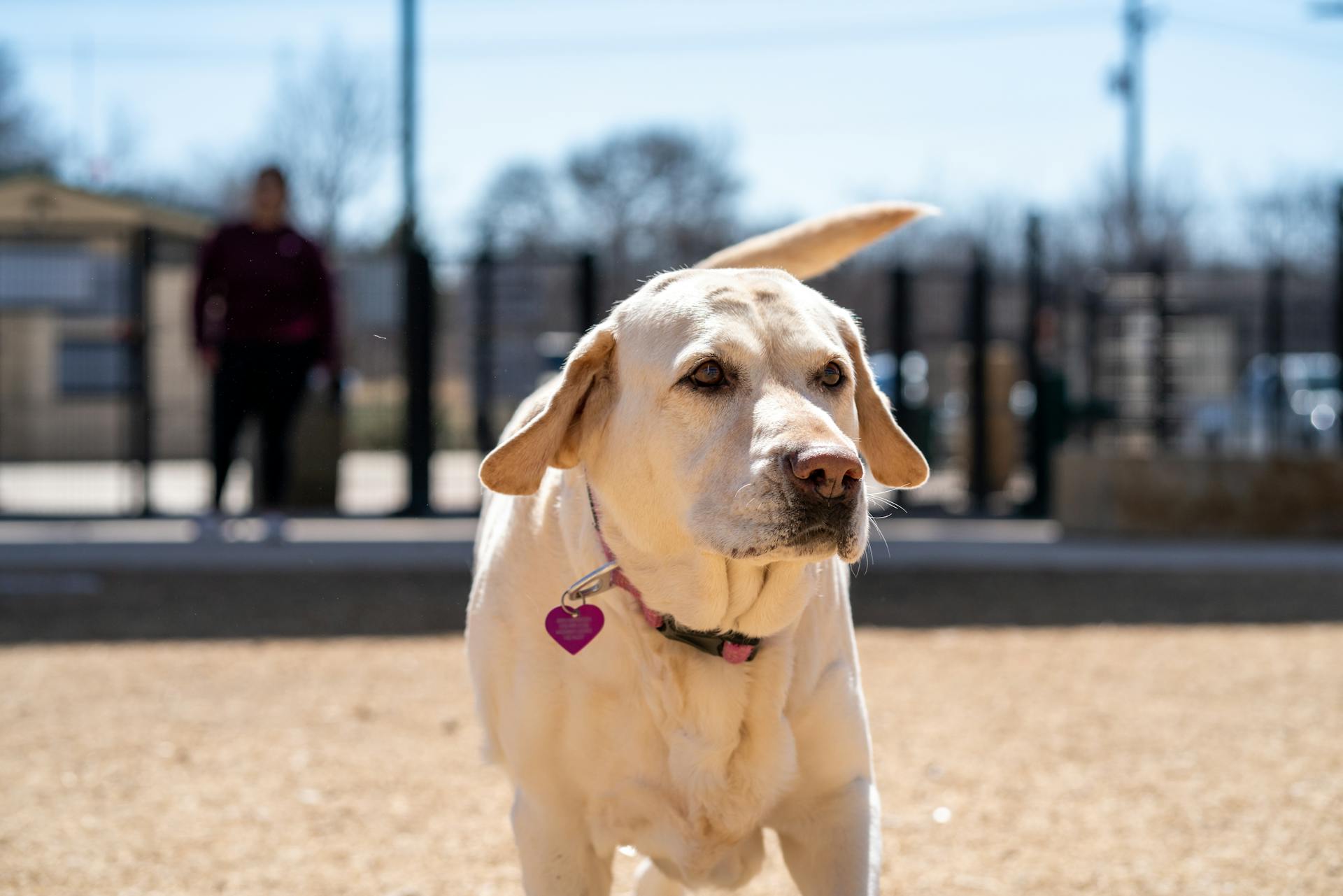
Miniature horses are being increasingly recognized for their ability to serve as service animals. They're surprisingly intelligent and can be trained to assist people with a range of disabilities.
One key advantage is that miniature horse service animals can provide physical support and balance assistance. This is particularly beneficial for individuals who use wheelchairs or have mobility issues.
In the United States, miniature horses are protected under the Americans with Disabilities Act (ADA) as service animals. This means they're allowed to accompany their owners in public places.
Their small size also makes them a great option for people living in apartments or other spaces where larger dogs may not be feasible.
Consider reading: Ada Law for Service Dogs
Service Animals and the Law
Service animals are protected under the Americans with Disabilities Act (ADA), which requires businesses and organizations to allow them in all areas where customers are allowed.
The ADA defines a service animal as a dog that has been individually trained to perform tasks or do work for a person with a disability, but it also includes miniature horses.
Miniature horses can be trained to assist individuals with disabilities, such as guiding the blind, alerting the deaf, and providing balance support for those with mobility issues.
Under ADA regulations, service animals are not required to wear special vests or identification tags, and their owners do not need to provide proof of certification.
Businesses must allow service animals in all areas where customers are allowed, including restaurants, stores, hotels, and public transportation.
Benefits of Miniature Horses as Service Animals
Miniature horses are recognized as service animals under the Americans with Disabilities Act.
They must meet four specific criteria to be accommodated: housebroken, under control of the handler, can be accommodated by a facility based on size and weight, and won't compromise safety operations.
Miniature horses possess traits that make them suitable for service animal work. They are intelligent animals that can be trained to assist humans with disabilities.
One reason miniature horses excel as service animals is their ability to be housebroken, just like dogs. This requirement ensures they're well-behaved in public spaces.
Their size and weight also make them a practical choice for service animals. According to the Americans with Disabilities Act, facilities must accommodate miniature horses based on these factors.
Miniature horses can be trained to perform specific tasks, making them valuable companions for people with disabilities.
Characteristics of Miniature Horse Service Animals
Miniature horses are highly alert and always looking out for dangerous scenarios. They have preserved this trait from their larger ancestors that were bred for transportation.
Their natural propensity to guide their master along the safest most efficient route is impressive. As a result, they have excellent judgment when avoiding obstacles and finding the safest route as they guide their handlers to a destination.
Miniature horses can be housebroken; they do not get fleas and only shed two times per year. This makes them a great choice for people who are allergic to dogs or prefer low-maintenance pets.
However, it's essential to note that individual airlines can choose to transport other animals, including miniature horses, for free in the cabin to accompany a person with disabilities. But there are no guaranteed protections or accommodations under federal law for the animal or its handler if the service animal is not a dog.
Focused Demeanor
Miniature horses are incredibly focused on their work and can maintain this focus even in distracting environments.
Their ability to stay concentrated is a key characteristic that makes them excellent service animals.
Trained miniature horses are not easily distracted, which means they can perform tasks consistently and efficiently. They have a strong sense of purpose and remain committed to assisting their handlers.
This focused demeanor also allows them to be highly alert and aware of their surroundings, making them a great asset in situations that require caution and attention to detail.
Good Manners
Miniature horses make great service animals due to their good manners and low-maintenance care. They can be housebroken and only shed twice a year.
One advantage of miniature horses is that they don't get fleas, making them a great choice for people who are allergic to dogs. This means you won't have to worry about flea medication or the hassle of dealing with flea bites.
If you're considering getting a miniature horse as a service animal, it's essential to check the airline's policy before making travel arrangements. Unfortunately, federal law states that miniature horses are not accepted as service animals for air travel.
However, some airlines may have more lenient policies regarding assistance animals, so it's worth looking into their pet policies to see if they allow miniature horses in the cabin. This way, you can still bring your trusty companion with you on flights.
Longer Lifespan
Miniature horses have an average lifespan of 30 to 40 years.
They can live for more than 50 years, making them a long-term companion for people who need service animals.
This is significantly longer than dogs, which typically serve their owners for only 8 to 12 years before retiring.
Advantages of Miniature Horses as Service Animals
Miniature horses make great service animals due to their unique traits and advantages.
They are recognized by the Americans with Disabilities Act as a legitimate species for service animals, alongside dogs.
In fact, miniature horses must meet four key criteria to be accommodated as service animals: they must be housebroken, under the control of the handler, able to fit in facilities based on size, weight, and type, and not compromise safety operations.
These equine animals possess traits that make them comparable to canines when it comes to being service animals.
Cost Effective
Training a guide dog can cost up to $60,000, which is a significant expense for many individuals.
This high cost is one reason why only 7,000 out of the 1.3 million people who are blind in the United States use guide dogs.
A Guide Horse could potentially be more cost-effective and ensure that more blind people receive a guide animal.
Expand your knowledge: Blind Dog Training
High Stamina
Miniature horses are known for their high stamina, which is a significant advantage when used as service animals. They can work long hours without getting tired.
One example of this is that healthy miniature horses are hearty and robust, even compared to larger breeds.
Their compact size also allows them to conserve energy and move efficiently, making them well-suited for tasks that require endurance.
Better Public Acceptance
Miniature horse service animals are easily recognizable as such because they're quite large, similar to medium-sized dogs.
Many people still struggle with accepting service dogs in public places, often mistaking them for pets due to their appearance.
The problem is less common with miniature horses since they're more obviously service animals.
One benefit of having a miniature horse service animal is that they can fit into smaller spaces, such as the passenger cabin on public transportation.
Miniature horses are also low maintenance when it comes to grooming, as they shed only twice a year and rarely get fleas.
You might enjoy: Is a Public Access Test Required for Service Dogs
Frequently Asked Questions
Can a miniature horse be claimed as a service animal?
Yes, miniature horses can be considered service animals under ADA regulations if they are individually trained to perform a specific task for someone with a disability. However, this exception is rare and requires specialized training.
Can a miniature horse service animal fly on a plane?
Yes, miniature horses are accepted for transport as service animals on planes. However, airlines may still deny cabin accommodation if the horse is too large or heavy.
How much does a seeing eye horse cost?
A miniature horse used as a seeing eye animal typically costs around $2,000. However, the cost of such an animal is often outweighed by its life-changing benefits for individuals like Shaw.
What is the purpose of a service horse?
Service horses assist individuals with disabilities by providing balance, mobility, and guidance through their exceptional eyesight and intelligence. They often serve as trusted companions for those navigating visual impairments or other challenges.
How much does the guide horse cost?
The Guide Horse Foundation provides guide horses at no cost to the blind. All expenses are covered by charitable donations and volunteer efforts.
Sources
- https://www.bgs.com/blog/2013/07/17/miniature-horses-as-service-animals/
- https://www.today.com/pets/miniature-horses-get-ok-be-service-animals-2d80556031
- https://www.treehugger.com/why-miniature-horses-make-such-great-service-animals-4858672
- https://www.serviceanimalregistryofcalifornia.com/miniature-horses-make-great-service-animals-5-reasons/
- https://animallaw.foxrothschild.com/2020/02/13/a-brief-history-of-miniature-horses-and-the-ada/
Featured Images: pexels.com


